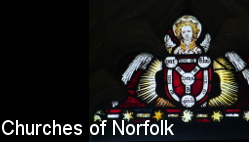
home I index I latest I glossary I introductions I e-mail I about this site
St Peter, Brampton
Follow these journeys as they happen on X/twitter.
St Peter, Brampton In spring, Brampton's churchyard is as idyllic as any in Norfolk, a remote and intensely rural spot that is best reached by crossing the water meadows of the River Bure by the footpath from Burgh-next-Aylsham church a quarter of a mile off, though it is much further by road. The lazy river winds aimlessly between the two parishes on its way to the far distant sea. A wooden footbridge crosses the flow, and then a muddy track takes you downstream through clambering thickets of angelica and nettles which on a day in May are energised by the spring sunshine after the long cold sleep of winter, before emerging onto a narrow lane beyond, which curls around Brampton churchyard. The church presents itself a little curiously. The 12th Century round tower was surmounted in the 15th Century by an octagonal bell stage made out of brick and dressed stone. The effect is a little awkward. Below, the chancel is much longer than the nave, but narrower, because the nave and what was once its south aisle run together under one roof. There appears to have been a chapel leading from the east end of the aisle, but this has long been demolished. The south porch and chancel east end are heavily buttressed, a mark of how soft the ground is here beside the Bure, and a vestry has been built on the south side of the chancel over the medieval priest doorway. All in all, a not unattractive assemblage. The first impression on entering is of a substantial 19th Century restoration. The arcade to the aisle has gone, accentuating the squareness of the nave in comparison with the length and narrowness of the chancel, which feels curiously off-centre, the arch that once led to the lost south chapel forming a non-identical twin beside it. It's the chancel that contains Brampton's most exciting feature, because there are no fewer than seven figures in brass. The most interesting of them is that to Robert and Isabella Brampton of 1468, on the south side of the sanctuary. They are depicted in their shrouds, prayers to the Blessed Virgin emerging as scrolls from their mouths. And there she is above them, the Virgo Lactans, which is to say the crowned Blessed Virgin Mary breastfeeding the Christchild. It is a remarkable survival. Nearby, mounted on the wall is John Brampton, who died in 1535, He stands between his two wives, Thomasina and Anne. Later members of the Brampton family, Edward and Joan, both died in 1622 and their brasses are also in the sanctuary. It is perhaps not the same quality as the two earlier groups, but shows the development of family brasses over a century and a half before the tradition died out altogether. The font is octagonal with shields on its panels, and was probably contemporary with the bell stage. An elaborately decorated cartouche on the south wall of the nave remembers that in the Alley (which is to say aisle) was buried the body of Margaret the wife of Thomas Beevor of Norwich. It goes on to tell us that she was the sole daughter & heiress of Robert Betts, Gent of this parish, being the last of that family and the first of the family of Beevor in this town. However, when she died in 1717 she was just 24 years old, and left no issue living. There is perhaps not much else of interest, but that doesn't matter. This quiet little old Norfolk parish church is doing what it does best, just being there. Simon Knott, December 2023 Follow these journeys as they happen on X/twitter. |
|
||||||||||||||||||||||||||||||||||||||||||||||||||||||
home I index I latest I introductions I e-mail I about
this site I glossary
Norwich I ruined churches I desktop backgrounds I round tower churches
links I small
print I www.simonknott.co.uk I www.suffolkchurches.co.uk